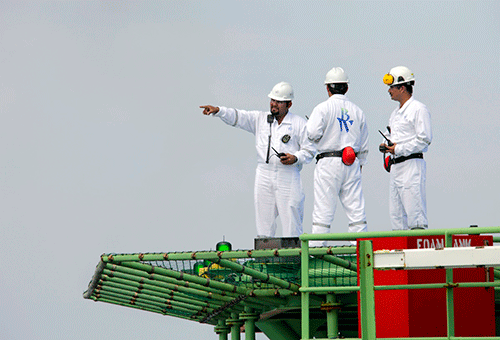The mines and energy ministry believes it prudent to maximise Namibia’s gas production to support domestic industrialisation. In this regard, government is working hand-in-hand with the BW Kudu and the National Petroleum Corporation of Namibia (Namcor) joint venture to advance the development of the Kudu Gas Field, with the operator annually submitting a work programme and budget for review, input and final approval.
This is according to former acting executive director in the ministry, Bryan Eiseb, who in response to queries from New Era stated: “We encourage the creation of synergies, open dialogue and the possibility of shared infrastructure for gas production, where it is feasible. The Kudu project is a priority for Namibia, and we welcome any commercial collaboration between companies operating in the Orange Basin”.
He added that government receives quarterly progress updates on the Kudu Gas project’s five components, namely drilling production wells, conversion of an existing semi-submersible drilling rig into a floating production facility, gas pipeline construction, power plant development, and transmission line installation. All of these components are being advanced simultaneously. As such, government anticipates production to commence during 2027, considering a 36-month lead time from project sanction to power- generation.
“Developing a gas-to-power project is complex, and we’re in the process of building the necessary skills with the help of the Petrofund. While most benefits will come after completion, we emphasise the importance of Namibian participation as early as possible through placing an emphasis on local content. Operators are actively sourcing goods and services from Namibia, even before project production,” Eiseb added.
Commenting on the anticipated benefits from the Kudu Gas resource, he said these can be manifold, benefiting both the country and individual service providers.
“Namibia will achieve energy security by replacing current power imports, and supporting its ambitious renewable energy goals. High renewable energy penetration requires a reliable base load for grid stability and augmentation during renewable downtime. Individual benefits include employment opportunities, goods and services’ provision, legal and financial advisory services, engineering support, and environmental expertise, enhancing local expertise and economic growth. This is in addition to the revenues expected to be generated from the gas production, which will propel the Namibian economy towards positive growth,” Eiseb stated.
Meanwhile, recent international media reports have emerged stipulating that TotalEnergies and Shell, both of whom have confirmed Orange Basin oil discoveries, have been instructed to work with the BW Kudu and Namcor joint venture to develop the natural gas field.
The media reports stated government wants relevant oil majors to work with the Kudu Gas operator on a joint development plan for the huge volumes of natural gas found in the Orange basin.
Earlier this year during the Oil and Gas Conference 2023 in Windhoek, Petroleum Commissioner in the mines and energy ministry Maggy Shino said “our animal has refused to die, and more life is being pumped into it. We, therefore, call upon you to look at the project (Kudu Gas) now with a new vision with a new lens and as a new opportunity because of additional gas reserves that we found.”
Six years ago, the licensed Kudu Gas operator, BW Energy, entered into a farm-in agreement for a 56% operated interest, with Namcor holding a 44% joint venture interest.
Shino said Namibia’s development plans for Kudu include a floating platform located at 170 kilometres offshore within the block owned by the joint venture.
“With this floating platform, we are then going to build a pipeline that is going to move the gas from offshore to Lüderitz to a point called Elizabeth Bay, where we are going to put up a power batch to convert the natural gas which we produce into electricity,” she noted at the conference while laying out the development plans.
“It’s now a project that is backed by infrastructure, and it is a clean energy source. With the production of electricity from natural gas, we are able to provide an energy transition solution, and being able to lower our carbon emission as a continent, and also as a nation. There is a need for us to have baseload power, and the Kudu Gas project is the only solution that can give us baseload power. Only with baseload power are you able to industrialise as a nation”, said Shino at the time.
Commenting on Kudu’s development, Namcor’s acting managing director Shiwana Ndeunyema yesterday said the joint venture has actively engaged NamPower regarding a power purchase agreement. There is also heightened interest from some southern African countries in buying power generated by
Kudu.


